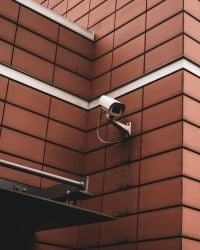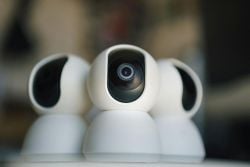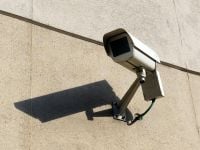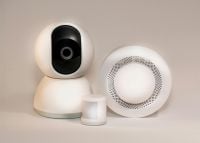You’ve probably heard the terms “CCTV” and “IP camera” being thrown around when people talk about home or business security. But what exactly is the difference between the two? A lot of us tend to Google this when we’re planning to install security cameras at home, in our shop, or even for our office. And honestly, it can get confusing — both record videos, both look like cameras, and both promise to keep your property safe.
But here’s the thing: CCTV cameras and IP cameras work very differently, and knowing how they operate can actually help you make a smarter decision. Whether you’re just looking for a simple way to check your gate, or want a full smart surveillance system with remote access, understanding the key differences is super important.
In this article,we’ll cover how both types of cameras work, the pros and cons, and which one might be a better fit for your needs here in Malaysia. So if you're not sure whether to go for traditional CCTV or a modern IP camera, this guide is here to help you decide with confidence.

Editor
Mae An NG chevron_right
Table of Contents
What is a CCTV Camera?

CCTV stands for Closed-Circuit Television. These are traditional security camera systems that send video footage through cables to a recording device (usually a DVR — Digital Video Recorder).
How it works:
CCTV cameras use coaxial cables to transmit video signals to the DVR, which then processes and stores the footage. You need separate power cables, and the footage is usually viewed on a monitor connected to the DVR.
Typical setup:
- Analogue cameras
- Coaxial video cables
- DVR box
- Monitor (optional)
Great for:
- Simple, local surveillance
- Small shops, homes, or places that don’t need remote access
What is an IP Camera?

IP stands for Internet Protocol. IP cameras are digital and connect to your network (Wi-Fi or LAN) to send and receive data.
How it works:
Unlike CCTV, IP cameras don’t need a DVR to record footage. They can stream video directly to your smartphone, computer, or cloud storage. Some setups use an NVR (Network Video Recorder), which is similar to a DVR but works digitally.
Typical setup:
- Digital IP cameras
- Ethernet cables or a Wi-Fi connection
- NVR or cloud storage
- Mobile app access
Great for:
- Remote monitoring
- Smart home integration
- HD video quality and advanced features
Key Differences Between CCTV and IP Camera
Let’s break it down further — here’s what sets them apart:
|
Feature |
CCTV Camera |
IP Camera |
|
Video Quality |
Usually lower (480p to 720p) |
Higher (1080p to 4K) |
|
Wiring |
Coaxial + power cables |
Ethernet or wireless |
|
Storage |
DVR (physical) |
NVR, Cloud, or SD card |
|
Remote Access |
Limited |
Excellent (via app/cloud) |
|
Installation |
More cables = messier |
Easier with wireless |
|
Price |
Generally cheaper |
Can be pricier upfront |
|
Smart Features |
Basic recording only |
Motion detection, face recognition, and alerts |
Video Quality: Analog vs Digital
- CCTV cameras, being analog, tend to have lower resolution. You might get blurry or pixelated images, especially when zooming in.
- IP cameras are fully digital, meaning you can enjoy HD or even 4K footage, making it easier to identify faces, car plates, and details. Perfect if you want high-quality evidence.
If you’re searching for "high-definition security camera Malaysia", IP cameras usually win here.
Storage Options
With CCTV, you’ll need a DVR that stores footage on a hard drive. Once it’s full, it overwrites old recordings — unless you manually save them.
IP cameras, on the other hand, offer multiple storage options:
- MicroSD card (in the camera itself)
- Cloud storage (a monthly subscription might be needed)
- NVR (more modern than DVR)
This flexibility means you’re less likely to lose important footage, especially useful for home break-ins or delivery thefts.
Remote Access and Smart Control
This is where IP cameras really shine.
With a CCTV system, you usually have to be on-site to view the footage. But with IP cameras, you can:
- Live-stream from your phone (even if you’re in Penang and your house is in KL)
- Get real-time alerts if motion is detected
- Use voice commands with Google Assistant or Alexa
These features are a must-have in today's smart homes.
Installation and Setup
- CCTV systems require more wiring and often need a technician to drill holes, run cables, and configure the DVR.
- IP cameras, especially wireless ones, are more DIY-friendly. Just plug them in, connect to Wi-Fi, and you’re good to go.
User Tip: If you're renting a place, IP cameras are ideal. No permanent drilling required!
Price: Which Is More Budget-Friendly?
Here in Malaysia, CCTV cameras are cheaper upfront, especially if you're buying a full kit for a small property.
But IP cameras offer better value in the long run with:
- No need for DVRs (cloud storage or SD cards work)
- Easy scalability (add more cameras anytime)
- Less maintenance
If you're shopping on Shopee or Lazada, compare IP camera bundles — many come with mobile app support and free cloud trials.
Which One Should You Choose For Your Home?
Consider Traditional CCTV (Analog) if:

- You have a very tight budget and just need basic, visible surveillance.
- You already have existing coaxial cabling in place from an old system.
- You don't need super high-resolution video or smart features.
- You're okay with a more complex installation.
Go for IP Cameras if:

- You want clear, high-resolution video (important for evidence!).
- You love smart features like remote viewing on your phone, motion alerts, and two-way audio.
- You prefer an easier installation, especially with Wi-Fi cameras.
- You want flexibility in where you store your recordings (NVR, SD card, cloud).
- You might want to start with one or two cameras and expand later. This is easier with IP systems.
For most Malaysian homes today, IP cameras offer a much better balance of features, image quality, and convenience. The ability to check on your home from your phone is a huge plus for peace of mind, especially when you're out of town or stuck in a KL traffic jam!
Final Thoughts
So now you know the key differences between CCTV vs IP cameras! If you’re setting up security at home, shop, or even your office, think about what you need most: clear video, easy setup, or just basic protection.
Remember, both types can keep your place safe. Just pick the one that suits your needs and budget.
